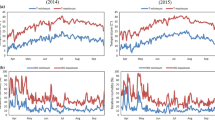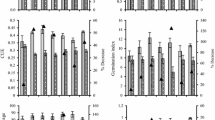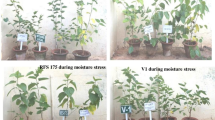Abstract
Global climate change enhances the effect of abiotic stress factors, which cause limited plant growth, yield losses, and reduced quality. Today, flooding has become an important stress factor restricting plant growth. Recently, researchers have worked out strategies that increase tolerance to flooding stress (Flo). This study aimed to examine the effects of Flo applied to melon cultivars on their agronomic and physio-biochemical properties. Commercially grown cultivars of melon, which is an important vegetable species with economic importance worldwide, included Kırkağaç type Sarı F1 (C1), Damla F1 (C2), Yucel F1 (C3), 1071 (candidate) (C4), Sürmeli F1 (C5), Westeros F1 (C6), Kırkagac 637 (C7), Kırkağaç 589 (C8), Super Soykan (C9), Kırkağaç local (C10), and Kyrgyzstan local (C11) which were the first treatment in this study. Another treatment was full irrigation (FI) and Flo. After 10 days of the application of flooding stress to plants during seedling growth, they were harvested, and some related measurements of their parameters were made. As a result of Flo application, all melon cultivars were adversely affected, as observed by decreases in values of plant fresh weight, plant dry weight, number of leaves, plant height, root fresh weight, root dry weight, and leaf area by approximately 30, 21, 24, 21, 28, 38 and 39%, respectively. Moreover, Flo negatively affected photosynthesis and pigment content, causing an increase of 47% in the malondialdehyde (MDA) content and 50% in the hydrogen peroxide (H2O2) content. On the other hand, significant increases were observed in proline and protein contents and antioxidant enzyme activities under stress. Based on the evaluated data, Kırkağaç 637, Kırkağaç 589, and Kyrgyzstan local cultivars that were the least affected by stress were identified as tolerant cultivars, while the most affected cultivars, Sarı F1 and Yücel F1, were found to be the sensitive cultivars.



Similar content being viewed by others
References
Agarwal S, Pandey V (2004) Antioxidant enzyme responses to NaCl stress in Cassia angustifolia. Biol Plant 48(4):555–560. https://doi.org/10.1023/B:BIOP.0000047152.07878.e7
Angelini R, Federico R (1989) Histochemical evidence of polyamine oxidation and generation of hydrogen peroxide in the cell wall. J Plant Physiol 135(2):212–217. https://doi.org/10.1016/S0176-1617(89)80179-8
Apel K, Hirt H (2004) Reactive oxygen species: metabolism, oxidative stress, and signal transduction. Annu Rev Plant Biol 55:373–399. https://doi.org/10.1146/annurev.arplant.55.031903.141701
Bange MP, Thongbai MSP (2004) Growth and yield of cotton in response to waterlogging. Field Crop Res 88(2–3):129–142. https://doi.org/10.1016/j.fcr.2003.12.002
Bennett J (2003) Opportunities for increasing water productivity of CGIAR crops through plant breeding and molecular biology. Water Product Agricult Limits Oppors Improv 1:103–126
Bhatt RM, Upreti KK, Divya MH, Bhat S, Pavithra CB, Sadashiva AT (2015) Interspecific grafting to enhance physiological resilience to floodingstress in tomato (Solanum lycopersicum L.). Sci Hort 182:8–17. https://doi.org/10.1016/j.scienta.2014.10.043
Bailey-Serres J, Chang R (2005) Sensing and signalling in response to oxygen deprivation in plants and other organisms. Ann Bot 96(4):507–518. https://doi.org/10.1093/aob/mci206
Bailey-Serres J, Parker JE, Ainsworth EA, Oldroyd GED, Schroeder JI (2019) Genetic strategies for improving crop yields. Nature 575:109–118. https://doi.org/10.1038/s41586-019-1679-0
Bates LS, Waldren RP, Teare I (1973) Rapid determination of free proline for water-stress studies. Plant Soil 39(1):205–207. https://doi.org/10.1007/BF00018060
Bartley GE, Scolnik PA (1995) Plant carotenoids: pigments for photoprotection, visual attraction, and human health. Plant Cell 7:1027–1038. https://doi.org/10.1105/tpc.7.7.1027
Bradford MM (1976) A rapid and sensitive method for the quantitation of microgram quantities of protein utilizing the principle of protein-dye binding. Anal Biochem 72(1–2):248–254. https://doi.org/10.1016/0003-2697(76)90527-3
Cao Y, Ma C, Chen G, Zhang J, Xing B (2017) Physiological and biochemical responses of Salix integra Thunb. under copper stress as affected by soil flooding. Environ Pollut 225:644–653. https://doi.org/10.1016/j.envpol.2017.03.040
Chance B (1955) Assay of catalase and peroxidase. Meth Enzymol 2:765–775. https://doi.org/10.1016/S0076-6879(55)02300-8
Chang YN, Zhu C, Jiang J et al (2020) Epigenetic regulation in plant abiotic stress responses. J Integr Plant Biol 62:563–580. https://doi.org/10.1111/JIPB.12901
Chen H, Zamorano MF, Ivanoff D (2010) Effect of flooding depth on growth, biomass, photosynthesis, and chlorophyll fluorescence of Typha domingensis. Wetlands 30:957–965. https://doi.org/10.1007/s13157-010-0094-y
Cramer GR, Urano K, Delrot S, Pezzotti M, Shinozaki K (2011) Effects of abiotic stress on plants: a systems biology perspective. BMC Plant Biol 11:163. https://doi.org/10.1186/1471-2229-11-163
Cruz FJR, Castro GLS, Silva JDD, Festucci-Buselli RA, Pinheiro HA (2013) Exogenous glycine betaine modulates ascorbate peroxidase and catalase activities and prevent lipid peroxidation in mild water-stressed Carap aguianensis plants. Photosynthetica 51:102–108. https://doi.org/10.1007/s11099-013-0004-7
Damanik RI, Ismail MR, Shamsuddin Z, Othman S, Zain AM, Maziah M (2012) Response of antioxidant systems in oxygen deprived suspension cultures of rice (Oryza sativa L.). Plant Growth Regul 67(1):83–92. https://doi.org/10.1007/s10725-012-9668-4
Desikan R, Cheung MK, Bright J, Henson D, Hancock JT, Neill SJ (2004) ABA, hydrogen peroxide and nitric oxide signaling in stomatal guard cells. J Exp Bot 55:205–212. https://doi.org/10.1093/jxb/erh033
Else MA, Coupland D, Dutton L, Jackson MB (2001) Decreased root hydraulic conductivity reduces leaf water potential, initiates stomatal closure and slows leaf expansion in flooded plants of castor oil (Riccinus communis) despite diminished delivery of ABA from the roots to shoots in the xylemsap. Physiol Plant 111:46–54. https://doi.org/10.1034/j.1399-3054.2001.1110107.x
FAO (2022) Food and agriculture organization, crop production statistics. http://www.fao.org/faostat/en/#data/QC. Accessed 17 May 2023
Folzer H, Dat J, Capelli N, Rieffel D, Badot PM (2006) Response to flooding of sessile oak: an integrative study. Tree Physiol 26:759–766
Fukao T, Barrera-Figueroa BE, Juntawong P, Peña-Castro JM (2019) Submergence and waterlogging stress in plants: a review highlighting research opportunities and understudied aspects. Front Plant Sci 10:340. https://doi.org/10.3389/fpls.2019.00340
Gardiner ES, Krauss KW (2001) Photosynthetic light response of flooded cherry bark oak (Quercus pagoda) seedlings grown in two light regimes. Tree Physiol 21:1103–1111
Gray SB, Brady SM (2016) Plant developmental responses to climate change. Dev Biol 419:64–77. https://doi.org/10.1016/j.ydbio.2016.07.023
Godoy F, Olivos-Hernández K, Stange C, Handford M (2021) Abiotic stress in crop species: improving tolerance by applying plant metabolites. Plants 10(2):186. https://doi.org/10.3390/plants10020186
Hasanuzzaman M, Al Mahmud J, Nahar K, Anee TI, Inafuku M, Oku H, Fujita M (2017) Responses, adaptation, and ROS metabolism in plants exposed to waterlogging stress. Reactive oxygen species and antioxidant systems in plants: role and regulation under abiotic stress 257–281. https://doi.org/10.1007/978-981-10-5254-5-10
Havir EA, McHale NA (1987) Biochemical and developmental characterization of multiple forms of catalase in tobacco leaves. Plant Physiol 84(2):450–455. https://doi.org/10.1104/pp.84.2.450
He N, Umer MJ, Yuan P, Wang W, Zhu H, Zhao S, Sun X (2022) Expression dynamics of metabolites in diploid and triploid watermelon in response to flooding. PeerJ 10:e13814. https://doi.org/10.7717/peerj.13814
Heath RL, Packer L (1968) Photoperoxidation in isolated chloroplasts: I. Kinetics and stoichiometry of fatty acid peroxidation. Arch Biochem Biophys 125(1):189–198. https://doi.org/10.1016/0003-9861(68)90654-1
Ipek M, Pirlak L, Esitken A, FigenDönmez M, Turan M et al (2014) Plant growth-promoting rhizobacteria (PGPR) increase yield, growth and nutrition of strawberry under high-calcareous soil conditions. J Plant Nutr 37(7):990–1001. https://doi.org/10.1080/01904167.2014.881857
Islam MR, Hamid A, Khaliq QA, Ahmed JU, Haque MM, Karim MA (2007) Genetic variability in flooding tolerance of mungbean (Vigna radiata L. Wilczek) genotypes. Euphytica 156:247–255. https://doi.org/10.1007/s10681-007-9372-z
Jackson M, Colmer T (2005) Response and adaptation by plants to flooding stress. Ann Bot 96(4):501–505. https://doi.org/10.1093/aob/mci205
Jia W, Ma M, Chen J, Wu S (2021) Plant morphological, physiological and anatomical adaption to flooding stress and the underlying molecular mechanisms. Int J Mol Sci 22(3):1088. https://doi.org/10.3390/ijms22031088
Jones A (2000) Does the plant mitochondrion integrate cellular stress and regulate programmed cell death? Trends Plant Sci 5:273–278. https://doi.org/10.1016/S1360-1385(00)01605-8
Kahraman A, Kendon EJ, Chan SC, Fowler HJ (2021) Quasi-stationary intense rainstorms spread across Europe under Climate Change. Geophys Res Lett 48(13):e2020GL092361. https://doi.org/10.1029/2020GL092361
Kao CH (2017) Mechanisms of salt tolerance in rice plants: cell wall-related genes and expansins. J Taiwan Agric Res 66:87–93
Kaur G, Kumar S, Nayyar H, Upadhyaya HD (2008) Cold stress injury during the pod-filling phase in chickpea (Cicer arietinum L.): effects on quantitative and qualitative components of seeds. J Agron Crop Sci 194(6):457–464. https://doi.org/10.1111/j.1439-037X.2008.00336.x
Kato Y, Collard BCY, Septiningsih EM, Ismail AM (2014) Physiological analyses of traits associated with tolerance of long-term partial submergence in rice. AoB Plants 6:plu058. https://doi.org/10.1093/aobpla/plu058
Keyvan S (2010) The effects of drought stress on yield, relative water content, proline, soluble carbohydrates and chlorophyll of bread wheat cultivars. J Anim Plant Sci 8(3):1051–1060
Liang D, Ni Z, Xia H, Xie Y, Lv X, Wang J, Lin L, Deng Q, Luo X (2019) Exogenous melatonin promotes biomass accumulation and photosynthesis of kiwifruit seedlings under drought stress. Sci Hortic 246:34–43. https://doi.org/10.1016/j.scienta.2018.10.058
Lichtenthaler H, Buschmann C (2001) Chlorophylls and carotenoids: measurement and characterization by UV-VIS spectroscopy. Curr Protoc Food Analt Chem. https://doi.org/10.1002/0471142913.faf0403s01
Liu Y-H, Offler CE, Ruan Y-L (2014) A simple, rapid, and reliable protocol to localize hydrogen peroxide in large plant organs by DAB-mediated tissue printing. Front Plant Sci 5:745. https://doi.org/10.3389/fpls.2014.00745
Lohani N, Singh MB, Bhalla PL (2022) Biological parts for engineering abiotic stress tolerance in plants. BioDes Res. https://doi.org/10.34133/2022/9819314
Lutts S, Kinet J, Bouharmont J (1996) NaCl-induced senescence in leaves of rice (Oryza sativa L.) cultivars differing in salinity resistance. Ann Bot 78(3):389–398. https://doi.org/10.1006/anbo.1996.0134
Mahdavian M, Sarikhani H, Hadadinejad M, Dehestani A (2020) Putrescine effect on physiological, morphological, and biochemical traits of carrizo citrange and volkameriana rootstocks under flooding stress. Int J Fruit Sci 20(2):164–177. https://doi.org/10.1080/15538362.2019.1605560
Mielke MS, Schaffer B (2010) Leaf gas exchange, chlorophyll fluorescence and pigment indexes of Eugenia uniflora L. in response to changes in light intensity and soil flooding. Tree Physiol 30:45–55. https://doi.org/10.1093/treephys/tpp095
Mishra A, Salokhe VM (2010) Flooding stress: the effects of planting pattern and water regime on root morphology, physiology and grain yield of rice. J Agron Crop Sci 196(5):368–378. https://doi.org/10.1111/j.1439-037X.2010.00421.x
Panda D, Sharma SG, Sarkar RK (2008) Chlorophyll fluorescence parameters, CO2 photosynthetic rate and regeneration capacity as a result of complete submergence and subsequent re-emergence in rice (Oryza sativa L.). Aquat Bot 88(2):127–133. https://doi.org/10.1016/j.aquabot.2007.08.012
Panda D, Barik J (2021) Flooding tolerance in rice: focus on mechanisms and approaches. Rice Sci 28(1):43–57. https://doi.org/10.1016/j.rsci.2020.11.006
Parent C, Berger A, Folzer H, Dat J, Crevecoeur M, Badot P-M, Capelli N (2008) A novel nonsymbiotic hemoglobin from oak: cellular and tissue specificity of gene expression. New Phytol 177:142–154. https://doi.org/10.1111/j.1469-8137.2007.02250.x
Patel PK, Singh A, Tripathi N, Yadav D, Hemantaranjan A (2014) Flooding: abiotic constraint limiting vegetable productivity. Adv Plants Agricult Res 1(3):00016. https://doi.org/10.15406/apar.2014.01.00016
Peng LT, Jiang YM, Yang SZ, Pan SY (2005) Accelerated senescence of fresh-cut chinese water chestnut tissues in relation to hydrogen peroxide accumulation. J Plant Physiol Mol Biol 31(5):527–532
Pitrat M (2008) Melon. In: Prohens J, Nuez F (eds) Handbook of plant breeding. Vegetables I. Asteraceae, Brassicaceae, Chenopoidicaceae, and Cucurbitaceae. Springer, USA, pp 283–315
Raza A, Razzaq A, Mehmood SS, Zou X, Zhang X, Lv Y, Xu J (2019) Impact of climate change on crops adaptation and strategies to tackle its outcome: a review. Plants 8:34. https://doi.org/10.3390/plants8020034
Qamer Z, Chaudhary MT, Du X, Hınze L, Azhar MT (2021) Review of oxidative stress and antioxidative defense mechanisms in Gossypium hirsutum L. in response to extreme abiotic conditions. J Cotton Res 4(1):1–9. https://doi.org/10.1186/s42397-021-00086-4
Saijo Y, Loo EPI (2020) Plant immunity in signal integration between biotic and abiotic stress responses. New Phytol 225:87–104. https://doi.org/10.1111/nph.15989
Sarkar RK, Reddy JN, Sharma S, Ismail AM (2006) Physiological basis of submergence tolerance in rice and implications for crop improvement. Curr Sci 91(7):899–906
Sasidharan R, Hartman S, Liu Z, Martopawiro S, Sajeev N, van Veen H, Yeung E, Voesenek LA (2018) Signal dynamics and interactions during flooding stress. Plant Physiol 176(2):1106–1117. https://doi.org/10.1104/pp.17.01232
Salah A, Zhan M, Cao CG, Han YL, Ling L, Liu ZH, Li P, Ye M, Jiang Y (2019) gamma-aminobutyric acid promotes chloroplast ultrastructure, antioxidant capacity, and growth of waterlogged maize seedlings. Sci Rep 9(1):484. https://doi.org/10.1038/s41598-018-36334-y
Seymen M (2021) How does the flooding stress occurring in different harvest times affect the morpho-physiological and biochemical characteristics of spinach? Sci Hortic 275:109713. https://doi.org/10.1016/j.scienta.2020.109713
Seymen M, Yavuz D, Dursun A, Kurtar ES, Türkmen Ö (2019) Identification of drought-tolerant pumpkin (Cucurbita pepo L.) genotypes associated with certain fruit characteristics, seed yield, and quality. Agric Water Manag 221:150–159. https://doi.org/10.1016/j.agwat.2019.05.009
Seymen M, Şahin AŞ, Tanrıverdi ÖB (2023) Mitigation effects of proline and glycine betaine to green onion under flooding stress. Gesunde Pflanzen. https://doi.org/10.1007/s10343-023-00854-z
Seymen M, Çiçek Arı B, Kal Ü, Issı N, Atakul Z, Yavuz D (2022) Mitigation effects of melatonin applied to cauliflower seedlings under different flooding durations. Gesunde Pflanzen. https://doi.org/10.1007/s10343-022-00797-x
Thakur P, Kumar S, Malik JA, Berger JD, Nayyar H (2010) Cold stress effects on reproductive development in grain crops: an overview. Environ Exp Bot 67(3):429–443. https://doi.org/10.1016/j.envexpbot.2009.09.004
Türkan İ, Bor M, Ozdemir F, Koca H (2004) Differential responses of lipid peroxidation and antioxidants in the leaves of drought tolerant P. acutifolius gray and drought-sensitive P. vulgaris L. subjected to polyethylene glycol mediated water stress. Plant Sci 168:223–231. https://doi.org/10.1016/j.plantsci.2004.07.032
United Nations (2023) Available online: https://www.un.org. Accessed 29 Nov 2022
Ullah I, Waqas M, Khan MA, Lee IJ, Kim WC (2017) Exogenous ascorbic acid mitigates flood stress damages of Vigna angularis. Appl Biol Chem 60:603–614. https://doi.org/10.1007/s13765-017-0316-6
Velikova V, Yordanov I, Edreva A (2000) Oxidative stress and some antioxidant systems in acid rain-treated bean plants protective role of exogenous polyamines. Plant Sci 151:59–66. https://doi.org/10.1016/S0168-9452(99)00197-1
Wang J, Long Q, Wang L, Luo H, Lyu H, Xu C (2013) Effects of flood stress and stress relieve on melon photosynthetic pigments and photosynthesis character. China Veg 8:50–55
Wegner LH (2010) Oxygen transport in waterlogged plants. In: Mancuso S, Shabala S (eds) Waterlogging signalling and tolerance in plants. Springer, Berlin, pp 3–22
Weng J, Li P, Rehman A, Wang L, Gao X, Niu Q (2021) Physiological response and evaluation of melon (Cucumis melo L.) germplasm resources under high temperature and humidity stress at seedling stage. Sci Hortic 288:110317. https://doi.org/10.1016/j.scienta.2021.110317
Witham FH, Blaydes DF, Devlin RM (1971) Experiments in plant physiology. Van Nostrand Reinhold Compan, New York, pp 55–56
Vorasoot N, Songsri P, Akkasaeng C, Jogloy S, Patanothai A (2003) Effect of water stress on yield and agronomic characters of peanut. Songklanakarin J Sci Technol 25(3):283–288
Yavuz D, Seymen M, Süheri S, Yavuz N, Türkmen Ö, Kurtar ES (2020) How do rootstocks of citron watermelon (Citrullus lanatus var. citroides) affect the yield and quality of watermelon under deficit irrigation? Agricult Water Manag 241:106351. https://doi.org/10.1016/j.agwat.2020.106351
Yavuz D, Seymen M, Yavuz N, Çoklar H, Ercan M (2021) Effects of water stress applied at various phenological stages on yield, quality, and water use efficiency of melon. Agricult Water Manag 246:106673. https://doi.org/10.1016/j.agwat.2020.106673
Yavuz D, Kılıç E, Seymen M, Dal Y, Kayak N, Kal Ü, Yavuz N (2022) The effect of irrigation water salinity on the morph-physiological and biochemical properties of spinach under deficit irrigation conditions. Sci Horticult 304:111272. https://doi.org/10.1016/j.scienta.2022.111272
Yavuz D, Seymen M, Kal Ü, Atakul Z, Tanrıverdi ÖB, Türkmen Ö, Yavuz N (2023) Agronomic and physio-biochemical responses of lettuce to exogenous sodium nitroprusside (SNP) applied under different irrigation regimes. Agricult Water Manag 277:108127. https://doi.org/10.1016/j.agwat.2022.108127
Yordanova RY, Christov KN, Popova LP (2004) Antioxidative enzymes in barley plants subjected to soil flooding. Environ Exp Bot 51(2):93–101. https://doi.org/10.1016/S0098-8472(03)00063-7
Zhang H, Li G, Yan C, Cao N, Yang H, Le M, Zhu F (2021) Depicting the molecular responses of adventitious rooting to waterlogging in melon hypocotyls by transcriptome profiling. 3 Biotech 11(7):351. https://doi.org/10.1007/s13205-021-02866-w
Zhou P, Qian J, Yuan W, Yang X, Di B, Meng Y, Shao J (2021) Effects of interval flooding stress on physiological characteristics of apple leaves. Horticulturae 7(10):331. https://doi.org/10.3390/horticulturae7100331
Acknowledgements
This research was a part of the Ph.D. dissertation prepared by Havvanur Kıratlı.
Author information
Authors and Affiliations
Contributions
HK performed formal analysis and data curation, MS participated in writing the original draft, data curation, investigation, methodology development, and validation, and GK did data curation.
Corresponding author
Ethics declarations
Conflict of interest
Authors declare that there are no competing interests.
Consent to participate
Not applicable.
Ethical approval
Not applicable.
Additional information
Publisher's Note
Springer Nature remains neutral with regard to jurisdictional claims in published maps and institutional affiliations.
Rights and permissions
Springer Nature or its licensor (e.g. a society or other partner) holds exclusive rights to this article under a publishing agreement with the author(s) or other rightsholder(s); author self-archiving of the accepted manuscript version of this article is solely governed by the terms of such publishing agreement and applicable law.
About this article
Cite this article
Kıratlı, H., Seymen, M. & Kıymacı, G. Determination of tolerance to flooding stress in melon cultivars by agronomic and physio-biochemical responses. Genet Resour Crop Evol 71, 1643–1657 (2024). https://doi.org/10.1007/s10722-023-01728-z
Received:
Accepted:
Published:
Issue Date:
DOI: https://doi.org/10.1007/s10722-023-01728-z




